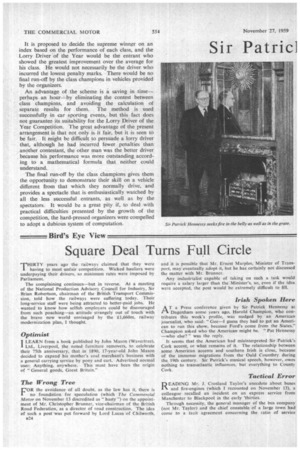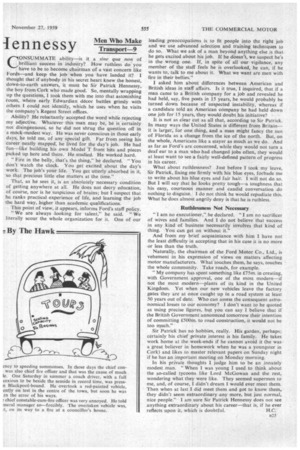Square Deal Turns Full Circle
Page 32

Page 33

If you've noticed an error in this article please click here to report it so we can fix it.
THIRTY years ago the railways claimed that they were having to meet unfair competition. Wicked hauliers were underpaying their drivers, so minimum rates were imposed by Parliament.
The complaining continues—but in reverse. At a meeting of the National Production Advisory Council for Industry, Sir Brian Robertson, chairman of the British Transport Commission, told how the railways were suffering today. Their long-service staff were being attracted to better-paid jobs. He wanted to know how selfish employers could be discouraged from such poaching—an attitude strangely out of touch with the brave new world envisaged by the £1,660m. railway modernization plan, I thought.
Optimist
ILEARN from a book published by John Mason (Wavertree), Ltd.. Liverpool, the noted furniture removers, to celebrate their 75th anniversary, that in 1890, 17-year-old John Mason decided to expand his mother's coal merchant's business with a general carrying service by pony and cart. Advertised normal user: Anything, anywhere. This most have been the origin of "General goods, Great Britain."
The Wrong Tree
• FOR the avoidance of all doubt, as the law has it, there is I no foundation for speculation (which The Comnzercial Motor on November 13 discredited as " hasty") on the appointment of Mr. Christopher Brunner, vice-chairman of the British Road Federation, as a director of road construction. The idea of such a post was put forward by Lord Lucas of Chilworth,
B24 and it is possible that Mr. Ernest Marples, Minister of Transport, may eventually adopt it, but he has certainly not discussed the matter with Mr. Brunner.
Any industrialist capable of taking on such a task would require a salary larger than the Minister's, so, even if the idea were accepted, the post would be extremely difficult to fill.
Irish Spoken Here
AT a Press conference given by Sir Patrick Hennessy at Dagenham some years ago, Harold Champion, who contributes this week's profile, was nudged by an American journalist, who said: " Gee—I guess they had to get an American to run this show, because Ford's come from the States." Champion asked who the American might be "Pat Hennessy —who else? " was the reply.
It seems that the American had misinterpreted Sir Patrick's Cork accent, or what remains of it. The relationship between some American accents and southern Irish is close, because of the immense migrations from the Ould Counthry during the 19th century. Sir Patrick's musical speech, however, owes nothing to transatlantic influences, but everything to County Cork.
Tactical Error
READING Mr. J. Crosland Taylor's anecdote about buses and fire-engines (which I recounted on November 13), a colleague recalled an incident on an express service from Manchester to Blackpool in the early 'thirties.
Through necessity, the general manager of the bus company (not Mr. Taylor) and the chief constable of a large town had come to a tacit agreement concerning the ratio of service
ency to speeding summonses. In those days the chief conwas also chief fire officer and that was the cause of much le. One Saturday in summer a coach driver, with a full Anxious to be beside -the seaside in record time, was pressn Blackpool-bound. He overtook a red-painted vehicle. ently on test in the centre of the town, but soon he was rn the error of his ways.
chief constable-cum-fire officer was very annoyed. He told meral manager so—forcibly. The overtaken vehicle was, :t, on its way to a fire at a councillor's house.
















































































































